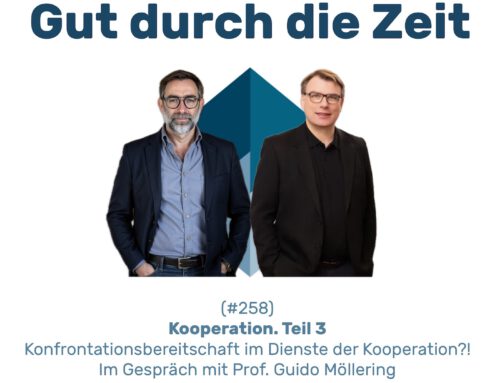INKOVEMA Podcast „Well through time“
#147 – Mediation as a product
Part 1 - Market psychology perspectives. In conversation with Damaris Deinert
Well through time. The podcast about mediation, conflict coaching and organisational consulting.
Damaris Deinert, business psychologist and mediator; currently works as head of department at Arbeit und Leben e.V. (Chemnitz).
Contents:
Today it's about the practice of mediation.
The discussion with Damaris Deinert will not be about the way mediators conduct mediation, but about the OB of mediation: Why do so few of the vast number of (highly escalated, long-lasting) conflicts end up in a mediative, moderating process?
It is about the whole mountain of conflicts in which the respective conflict parties, the potential mediators, but also the other stakeholders (stakeholders and interest groups) of a conflict situation, do not manage to bring this conflict to mediation. What is going wrong in the supplier and marketing process if, according to the basic assumption, the product is so important, great and necessary?
Mediation is many things.
For some it is a hope for conflict resolution, for others it is a way of earning a living, for thirds it is an alternative to court, for fourths it is an attitude, for fifths it is a procedure, for sixths it is a method and for sevenths it is sheer disappointment.
The perspective of today's discussion is that mediation is quite simply a product sold on the market. It may sound like a snooze, but mediation also wants to be sold!
The Master thesis by Damaris Deinert with the title: „The IHK's unused mediation services - no need for SMEs*?“ is a scientific study on the service of mediation. Various approaches and criteria for the systematisation of services are presented and mediation is classified with regard to these criteria. The connection between customer-orientation and sales success is also examined in more detail. Possible difficulties in the promotion of mediation by companies, such as the lack of commissioning and monitoring of employees, are also pointed out.
The Essential psychological influencing factors The questions regarding the use of mediation in small and medium-sized enterprises (SMEs) cover various aspects. On the one hand, knowledge, emotions, motives and attitudes play a decisive role in the decision in favour of or against mediation. The decision in favour of mediation is a Risky purchase decision. Heuristics play an important role in situations in which decision-making behaviour for or against a product is characterised by a lack of information and uncertainty. Heuristics are simple rules for forming judgements or making decisions that are used in particular for complex problems. They can lead to correct or approximately correct judgements and decisions, but under certain conditions they can also systematically lead to incorrect judgements. Various heuristics can be identified that are used to form judgements and decisions regarding the use or non-use of mediation. These include
- the take-the-best heuristic,
- the recognition heuristic,
- the availability heuristic,
- the consensus heuristic and
- the Habitual Heuristic. Product characteristics and the quality of trust in the provider also influence the purchase decision. However, personal recommendations are also a relevant factor for the use of mediation in SMEs.
In the podcast, Sascha Weigel and Damaris Deinert discuss the various psychological factors influencing the decision in favour of or against mediation as a conflict resolution procedure. It also examines the Marketing of mediation which requires a targeted approach to reach potential customers. Some best practices include
- emphasising the economic benefits for companies, such as time and cost savings and risk minimisation.
- In addition, it is important to emphasise the social and psychological aspects of mediation, such as maintaining relationships and considering the interests of all parties involved.
- Advertising should focus on the needs and concerns of the company and describe the "product" as concretely and tangibly as possible.
- While the benefits of mediation should be clearly emphasised, both for credible marketing and for informed decision-making on the part of customers
- it may also be advisable to outline some of the disadvantages of mediation as a conflict resolution process.
- It would also increase the credibility of the product if mediators had personal experience of mediation in their own conflicts.
- Marketing should also rely on personal recommendations and the involvement of multipliers such as chambers and other relevant organisations.
As a mediator, it can be helpful to specialise in certain target groups in order to increase trust.
Literature:
- Damaris Deinert: The IHK's unused mediation services - no demand from SMEs? An attempt at a market-psychological explanation (Volume 23)





Leave A Comment